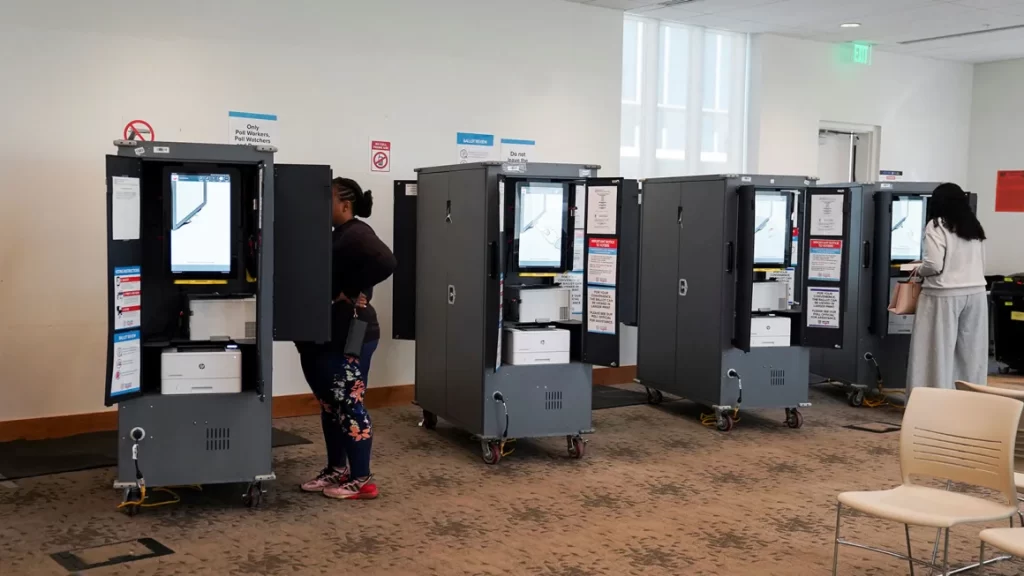A Georgia judge has deemed a series of contentious new election regulations, supported by allies of former President Donald Trump, unconstitutional. The ruling, issued by Fulton County Superior Court Judge Thomas Cox, addresses two key rules that Democrats argue would lead to post-election confusion in this pivotal battleground state. The new regulations had sparked significant concern among voting rights advocates and prompted swift legal challenges.
The two main rules in question required county election officials to conduct a “reasonable inquiry” into election results before certifying them and permitted them to “examine all election-related documentation created during the conduct of elections prior to certification.” Judge Cox stated, “The court here declares that these rules are illegal, unconstitutional, and void.”
With Georgia’s 16 electoral votes critical to both Trump and Democratic nominee Vice President Kamala Harris, the stakes are high. In the 2020 election, President Joe Biden secured the state by a narrow margin of just over 10,000 votes, underscoring Georgia’s significance in national politics.
Early voting in Georgia commenced on Tuesday, showcasing record turnout amid the ongoing political tension. The new election rules were put forth by three GOP members of the Georgia State Election Board, who garnered attention after Trump praised them at a rally in Atlanta this past August. “They’re on fire. They are doing a great job,” Trump stated during his speech, calling them “pit bulls fighting for transparency, honesty, and victory.”
Following the adoption of these rules in August, they faced immediate opposition from Democrats and advocacy groups. Critics feared that the regulations would empower election officials to postpone or refuse certification of election results while seeking alleged fraud or irregularities. This concern was pivotal in prompting legal action against the rules.
In his ruling, Judge Cox criticized the “reasonable inquiry” requirement, arguing that it introduced an “undefined step into the certification process.” He also found the examination rule to be problematic, stating it “creates a statutorily unbounded scope under which election superintendents can consider unauthorized materials when tabulating, canvassing, and certifying election results.”
The Georgia State Election Board, which is controlled by the GOP, maintained that the rules do not grant discretion to county officials. However, critics argue that the ambiguity surrounding what constitutes a “reasonable inquiry” could allow partisan officials to exploit their discretion to challenge or dismiss legitimate election outcomes.
The legal challenge was spearheaded by Eternal Vigilance Action, an election advocacy group that aims to ensure fair voting practices. In addition to the aforementioned rules, Judge Cox also invalidated a requirement that mandated officials to hand-count the number of ballots cast at each polling place. He noted that Georgia law does not support such a requirement. In a separate case, another judge had already paused the ballot hand-counting rule, indicating a broader judicial scrutiny of the state’s election regulations.
Cox articulated his concerns about the hand-counting rule, stating that it “vastly expands the authority and obligations of poll officials in preparing ballots pre-delivery to the superintendents and pre-certification.” This ruling highlights the ongoing legal battles surrounding election integrity and access, especially in a state that has become a focal point of national debates over voting rights and election security.
As early voting continues, the implications of this ruling may reverberate through Georgia’s electoral process. The outcome of such legal challenges will likely influence not just this election cycle but also future legislative efforts aimed at reshaping election laws in the state.
The tension surrounding Georgia’s election laws reflects broader national trends, as many states grapple with the balance between ensuring election security and maintaining access to the ballot. As the political landscape evolves, the rulings in Georgia could set important precedents for other states facing similar challenges.









